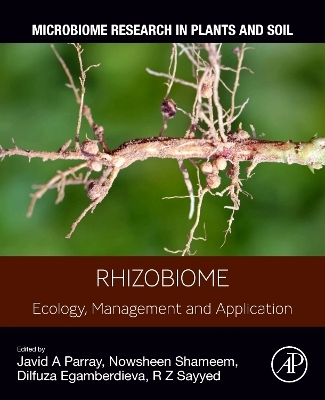
Rhizobiome
Academic Press Inc (Verlag)
978-0-443-16030-1 (ISBN)
Microbial-root associations are essential to assist plants under abiotic and biotic stresses and are necessary and beneficial to enhancing agricultural crop production. Numerous studies have enhanced our vision of the complex interactions between the plant, the associated microbial communities, and the environment. Further, microbe – microbe interactions allow the simulation microbial community interactions naturally, and is one of the many modern methods for the development of novel and effective metabolites.
Javid A Parray is currently teaching at the Department of Environmental Science, GDCEidgah, affiliated with Cluster University, Srinagar. His research interests include ecological and agricultural microbiology, climate change, microbial biotechnology, and environmental microbiomes. He has also done his Post Doctorate Research from the University of Kashmir. Dr Parray was also awarded a Fast Track Young Scientist Project by SERB – DST, GoI New Delhi. Dr Javid was also awarded “Emerging scientist year Gold Medal for the year 2018 by the Indian Academy of Environmental Science. Dr Parray is the course coordinator for the UG- Programmes for CeC-MOOCS Swayam in Environmental Science. Dr Parray is an expert review member in the field of environmental science in the CSTT, Ministry of Education, GoI New Delhi. Nowsheen Shameem presently works as an assistant professor in the Department of Environmental Science Cluster University Srinagar, Jammu and Kashmir, India. She worked as project associate in a DBT Sanctioned project entitled “Spawn Production for the Entrepreneurs of Kashmir Valley at CORD, University of Kashmir. Dr. Shameem has a strong interest in studying mushroom biology, bioactivity, and medicinal chemistry. She has dealt with bioactivities of endemic/threatened medicinal plants of Kashmir valley and other applied microbiology aspects, and has published many research articles in reputed, referred, international and national journals. Dilfuza Egamberdieva is a research associate at the Centre of Agricultural Landscape Research, Germany and head of Joint Uzbek-China Key Lab of Ecobiomes of Arid Lands, National University of Uzbekistan. Her research interests include microbial ecology and diversity, plant-microbe interaction, plant nutrition and stress tolerance, and plant biological disease control. She has been awarded the SCOPUS-2019 Award “Top Scientist of the Year, TWAS (The World Academy of Science) Award in Agricultural Sciences (2013), and TWAS-TWOWS-SCOPUS Young Women Research Award (2009), as well as several Fellowships such as President’s International Fellowship for Visiting Professors (PIFI), The Chinese Academy of Sciences (CAS), and the Georg Forster Research Fellowships, Alexander von Humboldt Foundation. She is a member of several journals’ editorial board, authored seven books published by Elsevier and Springer, and co-authored over 200 publications in per reviewed journals. Prof. Riyaz Z Sayyed is a Professor and Head, Department of Microbiology, PSGVP Mandal’s Arts, Science College, Shahada, India. Currently, he serves as the President of the India chapter of the Asian PGPR Society for Sustainable Agriculture (Estd 2019). To his credit, he has received the Fellow Indian Phytopathological Society Award (2021), Best Teachers Award, Young Scientist Award (2005, 2008, and 2012), Prof M M Sharma Award, Springer-Society Award (2020), Award for Excellence in PGPR Research (2017, 2018, 2019). He is Associate Editor of Environmental Sustainability (Springer) and Guest editor of Sustainability (MDPI), Academic Editor of Plos One, Frontiers in Microbiology and Peer J . He has over 25 years of teaching and 20 years of research experience in Microbiology and Biotechnology. He has authored and co-authored over 250 research papers in high IF international journals as well as multiple books and chapters. He has delivered many invited talks at several Southeast Asian and European Countries.
1. Diversity of various symbiotic associations between microbes and host plants 2. Amelioration of biotic stress by using rhizobacteria for Sustainable crop produce 3. Microbes: Salient Tools in Achieving Ecosystem Approaches 4. The role of rhizobacterial volatile compounds in increasing plant tolerance to biological and non-biological stresses 5. Bioremediation Potential of Rhizosphere microbes: current perspectives 6. Plant growth-promoting rhizobacteria (PGPR): their potential as antagonists and biological control agents 7. Rhizospheric microbiome: Organization and bioinformatics studies 8. Microbiome Biodiversity- current advancement and applications 9. Microbial Consortium with multifunctional plant growth-promoting attributes: Future Perspective in Agriculture 10. Nutrition and cultivation strategies of core Rhizosphere Microorganisms 11. Bioengineering of rhizobiome towards sustainable agricultural production 12. Rhizosphere Spatiotemporal analysis: a comprehensive study 13. Azospirillum, a free-living nitrogen-fixing bacterium: Smart Agriculture and Sustainable Exploitation 14. Plant-microbe interactions: Different perspectives in promoting plant growth and health 15. Rhizosphere ecology and management for improving nutrient use efficiency and crop productivity 16. Recent advances in discovery of new drugs from plant associated microbes 17. Plant Health: feedback effect of root exudates and rhizobiome interactions 18. Ecotypic adaption of plants and role of microbiota to ameliorate the environmental extremes using contemporary approaches 19. Ecological and structural attributes of soil rhizobiome affecting plant soil feedbacks under biotic stress 20. Bioinformatics study of role of rhizobiome to biologically control the pathogens of Vegetables 21. Multi omics analysis of rhizosphere and plant Health 22. Chemical profiling of metabolites of Bacillus Sps: A case study 23. Achievements of Prof. Hiltner vis a vis the contributions towards rhizopshere science
| Erscheinungsdatum | 03.08.2023 |
|---|---|
| Reihe/Serie | Microbiome Research in Plants and Soil |
| Verlagsort | San Diego |
| Sprache | englisch |
| Maße | 191 x 235 mm |
| Gewicht | 1020 g |
| Themenwelt | Naturwissenschaften ► Biologie ► Botanik |
| ISBN-10 | 0-443-16030-9 / 0443160309 |
| ISBN-13 | 978-0-443-16030-1 / 9780443160301 |
| Zustand | Neuware |
| Informationen gemäß Produktsicherheitsverordnung (GPSR) | |
| Haben Sie eine Frage zum Produkt? |
aus dem Bereich


